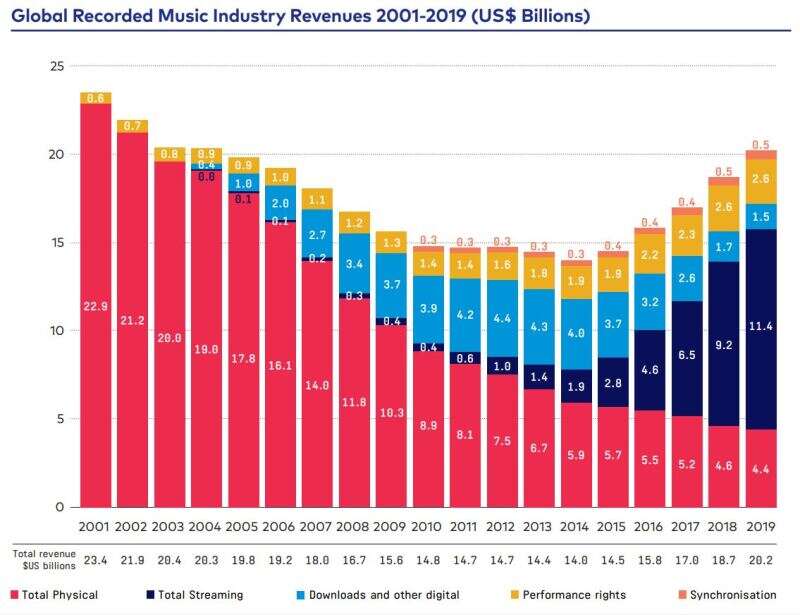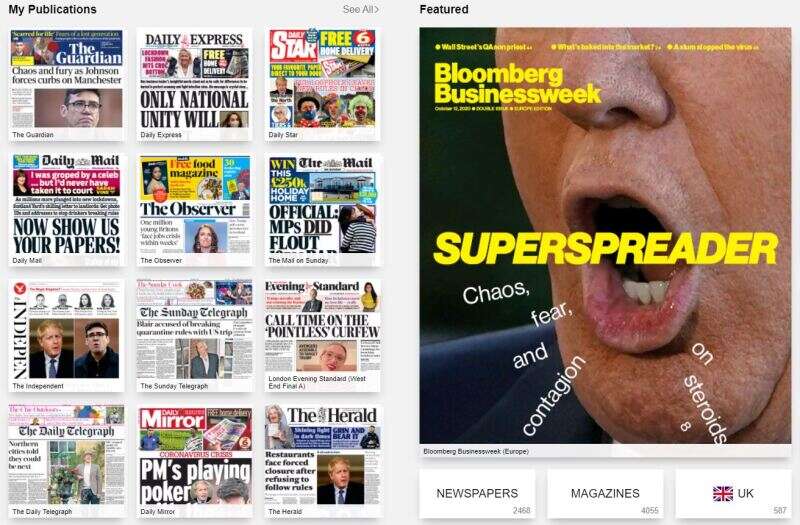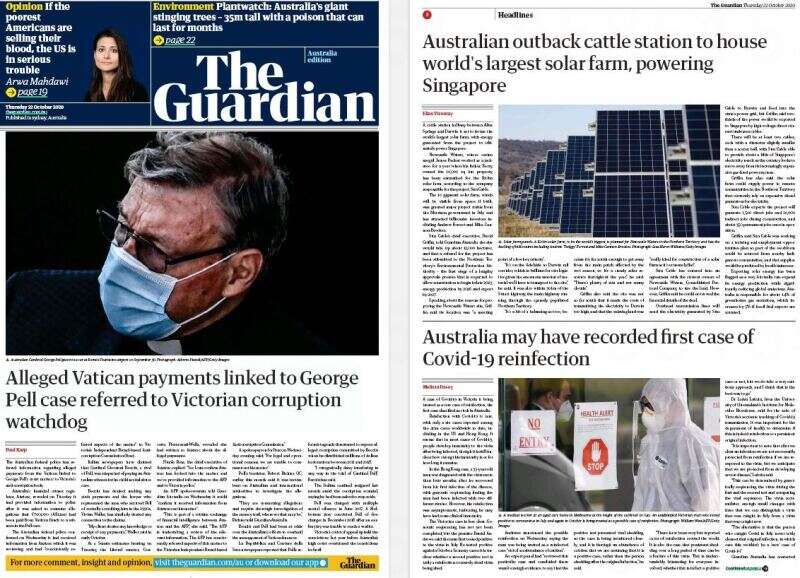
In 2005, as the Arctic Monkeys belted out of every radio, global revenue for the recorded music industry was still riding reasonably high at around $20bn , according to IFPI.
But it was about to fall off a cliff as online pirating took hold and revenue had slumped to $14bn by 2014.
Salvation, however, came in the form of the disruptive, all-you-can-eat streaming model pioneered by Spotify in 2009. By 2019, global music industry revenues had bounced back to 2002 levels.
That’s a drop in real terms, but the sort of U-shaped recovery that the newspaper and magazine industry can only dream of. Streaming revenues of $11.4bn in 2019 more than made up for lost physical record and CD sales and falling download sales.

Today, 2005 is considered to be the high-water mark of newspaper profitability, with UK national and regional newspapers together making £5bn in ad revenue that year. By 2019, this had dropped to around £2bn.
According to accountants PWC, this trend is only going to continue. It estimates global newspaper advertising revenue (print and online) of $49.3bn in 2019 will fall to $36bn in 2024. Circulation revenue globally is forecast to fall from $59bn to $50bn in the same period.
Could a Spotify-style solution work for the news industry as it has done for music (and for video entertainment through outlets like Netflix)? There are plenty of companies trying to make it happen (more on them below) and from a consumer point of view, it seems to make sense.
As most quality news sources in the commercial sector disappear behind paywalls, they are competing for an ever-smaller slice of the small minority willing to pay for news online.
If all news providers could sign up to a Spotify-style service and the price was right, wouldn’t that be sufficiently compelling to transform the market?
We asked Press Gazette’s readers if they would pay £10 a month for a service that offered access to most premium consumer news websites. Some 32% of the 1,091 users who voted said they would, while 64% said they would not.
This suggests there may be an untapped market for bundled news subscriptions in the UK. But at the Spotify price point, it would not be enough to pay the bills on its own.
Making the big assumption that Press Gazette’s survey translated to one-third of the UK working population (about 10m people) that would equate to £1.2bn per year – nowhere near enough to cancel out lost advertising revenue, but a very handy addition to the economic mix.
Project Alesia: A missed opportunity to create Spotify for news
Around the same time that Spotify was revolutionising the music industry, UK newspaper publishers were building something similar for the news industry called Project Alesia. The News Corp project would have offered bundled online access to every national newspaper but was scuppered by publishers’ concern at the time about the growing power of the Murdoch empire.
The man in charge of that scheme, Dominic Young, is today sceptical about the chances of Spotify-for-news ever getting off the ground. Although it is worth noting that as the founder of Axate, a micropayments system for publishers, he has a dog in this fight.
Casting his mind back just over a decade, he says: “Everyone was talking about subscriptions at that time because advertising had collapsed.
“Bundling is a way of creating a product that appeals to a far greater audience than any particular product can on its own. The problem is finding a way to divide that £10 a month fairly between the various publishers.
“Whenever somebody new joins you are still dividing up the same pot. The bigger the bundle the less valuable it is for individual publishers.
“It’s different from music and film because the cost of producing a newspaper is really quite high whereas the cost of providing a listener with Bohemian Rhapsody by Queen is virtually nil.”
The payment models adopted by the various bundled news subscriptions vary but no one has yet come up with something sufficiently compelling for publishers to persuade most to sign up.
Pressreader is perhaps the company which has come closest to creating a Spotify-style service for news.

Having launched in 2003, it now delivers 800m articles per month to readers. It provides access to 7,000 newspaper and magazine titles around the world and is the most comprehensive of all the bundled subscription offerings (and also the most expensive at £24.95 or $29.99 a month).
Chief executive Nikolay Malyarov says that whereas artists and film-makers are content for platforms to be the main publishers of their content, most newspaper and magazine companies are not there yet.
“A number of publishers still think the only way people should be consuming their content is by going to them directly.”
He describes Pressreader as a “discoverability platform”, a way for readers to snack on a wide variety of titles and then possibly go on to subscribe directly with them to enjoy the extra functionality and added benefits (such as newsletters) that a direct relationship provides.
He says: “You have to lead readers to an understanding that quality journalism has to be paid for.” And he believes platforms like Pressreader can have a part to play in doing this.
Like all the big bundled subscription companies, Pressreader deploys a great deal of technology and elbow grease to ensure that magazine and newspaper pages render effectively on smaller screens, including offering text-only viewing.
Its model is mainly based around being a virtual newsstand that allows you to browse thousands of print editions. And somewhat amazingly, it can provide print-style editions of titles that have never been near a press.
An example of this is Guardian Australia, where editors give it a list of articles every day and Pressreader renders them into a reasonably convincing print-style edition.

Readly is one of the biggest subscription bundlers by number of titles and although it offers access to some newspapers (such as The Guardian, Reach national titles, Independent and Evening Standard) its main market is catering for magazine lovers.
Chief content officer Ranj Begley described the experience of using the app as “literally as if you are flicking through a magazine. Our customers want disturbance-free reading. They like to look at the ads but they like to flick through as they would do a magazine.”
With more than 300,000 subscribers Readly delivers significant additional revenue to publishers.
Begley says: “For some of our publishers where they have niche titles the revenue is incremental, it’s nice to have. For others where they have large portfolios of magazines it’s significant. A lot of our publishers now actually have a budget line for Readly.”
The big question (and presumably the one which stops every publisher from signing up to services like Readly) is does it cannibalise in-house subscription sales?
Begley says: “Publishers have always had that direct-to-consumer issue. It’s really difficult to compare our business model with a 12-month subscription.”
But she said their research suggests that cannibalisation of existing subscribers is less than 2% per title.
“Customers come to Readly because they like the breadth of content and not being restricted to one title. They are new profiles that we are bringing to the publishers.”
Like Pressreader, Readly publishes some titles exclusively to the platform raising the prospect that even if print were to die altogether, traditional print-style magazines could live on.
Cafeyn (which was known as LeKiosk until 2019) is another major player in the magazine/newspaper bundling market.
Founded by Ari Assuied around the same time as Spotify, he was inspired by wanting to access magazines and newspapers from his native France whilst abroad.
He says readers of the platform tend to access eight to ten titles per month, and because no one is going to subscribe to that many magazines and newspapers he is clearly giving publishers a new revenue stream.
He says: “I believe that to succeed in this market the value that you can provide is around visitor experience. Cafeyn provides a unique visitor experience.”
The drawback with Cafeyn and the other bundlers is that – slick as they are, and fantastic value in their way – they don’t yet offer the Spotify-style completeness which makes signing up to a streaming service a no-brainer for many music lovers. Too many premium titles are still missing.
Back to Pressreader’s Malyarov on what it will take to create a Netflix/Spotify for journalism and news: “The company which will succeed at the end (and, perhaps, more than one), is the company that will provide the greatest selection of quality trusted content that satisfies all interests, and will do so with the best user experience built around the relevancy of that content to each user specifically.
“To this date, I’m looking forward to each Monday when Spotify releases a new Discover Weekly playlist, which is built around my likes and gives me music that I know, and lots of music that I haven’t heard before but am almost instantly falling in love with. That’s the objective for all of us. Have readers fall in love with this.”
Bundled newspaper/magazine offerings at a glance:
Pressreader
Who is on it?
Pressreader began with newspapers and added magazines to the mix in 2012. It now has more than 7,000 newspaper and magazine titles across 120 countries.
What does it cost?
Pressreader Select offers access to your pick of 15 titles for £9.99.
Access to every title costs £24.95 ($29.99)
What is the business model?
Publishers are paid a fee for each edition that is downloaded
Press Gazette’s Verdict
Its coverage of the newspaper market is impressive and it is wonderful to have access to the biggest regional titles and international ones too. But the gaps in its coverage, notably The Times titles and the FT, mean it is not yet a comprehensive one-stop-shop.
The hundreds of magazine titles on offer mean Pressreader provides plenty of value. But the omissions of premium titles like The Economist, New Statesman, Private Eye and The Spectator mean that news junkies do not get the coverage they might need to justify seeing it as a Spotify-style service offering access to nearly everything.
Apple News+ (full platform profile here)
Who is on it?
Around 300 publications including a number of premium titles such as The Times, Wall Street Journal The New Yorker
What does it cost?
£9.99 per month
What is the business model?
Apple takes 50% upfront of the subscription fee with the rest divided up amongst publishers.
Press Gazette Verdict
It’s a great deal for Apple, but a poor one for publishers who take a small and diminishing slice of the pie. Apple can’t be ignored. With around a billion devices they offer the prospect of a newsagent in everyone’s pocket. But they are unlikely to content themselves with the small margin and publisher-focused approach which would be needed for a Spotify-style system for news to take off.
Readly
Who is on it?
5,000 newspaper and magazine titles
What does it cost?
£7.99 per month
What’s the business model?
Revenue share with publishers based on dwell time
Press Gazette verdict
Fantastic value and a slick user interface. Nowhere near comprehensive but more than enough titles on there to justify the subscription depending on your interests. Weak on newspapers.
Cafeyn
Who is on it?
2,000 titles, including 375 in the UK.
What does it cost?
£7.99 per month
Business model
Does not share
Verdict
Offers a similar spread of titles to Readly in the UK and US and possibly the slickest user experience of all the bundlers. For magazine lovers there are more than enough titles available to offer excellent value. But like Readly it is weak on newspapers.
Magzter
Who is on it?
Claims to have 5,000 titles globally
What does it cost?
£9.99 per month
Verdict
OK selection of UK newspapers but poor on premium magazines.
Amazon Kindle Unlimited
Who is on it?
A “wide variety of magazines” are said to be on this app but they are only part of the Kindle bundle which includes books (audio and text).
What does it cost?
£7.99 per month
Verdict
It’s not in the same league as they other magazine/newspaper subscription bundlers (yet).
Email pged@pressgazette.co.uk to point out mistakes, provide story tips or send in a letter for publication on our "Letters Page" blog
